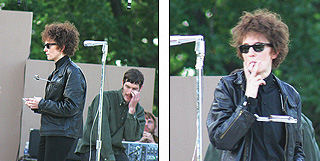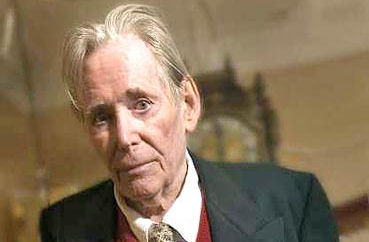Q: “The other thing that seems to be a constant in both [The Good Shepherd and A Bronx Tale] is the relationship between fathers and sons. And I wonder if it’s something you think about a lot.” A: “Yes.” Q: “You have four sons.” A: “I do.” Q: “And your father [artist Robert De Niro Sr.] was a big influence on your life?” A: “Yes.” Q: Do you consider this a political film? A: I don’t know. I wouldn’t say.” Q: “You don’t know or you wouldn’t say?” A: “I don’t know. I think people should see it the way they want.” — The Good Shepherd director Robert De Niro speaking to Time editor Belinda Luscombe.
Jennifer Hudson’s jelly
“Why should I feel like the minority when the majority of America is a size 12? Plus, a lot of singers don’t sound the same when they lose weight. I have a little singer’s pouch, and that’s where the voice comes from, so you’re all just going to have to get used to my jelly. Hey, somebody has to represent the big girls. Why not me?” — Dreamgirls costar (and — this is not a reach — probable Best Supporting Actress Oscar winner) Jennifer Hudson, speaking to Sean Smith in Newsweek‘s 12.11 issue.

Welcome turn-on
I’m also under embargo, but I just thought I’d say something about a movie I saw today. (Gee, what could that be?) I want to keep things oblique so I’ll put it this way: it’s a lot better than its first cousin. I mean, a lot better. I’m not sure if it’ll rocket right up into Best-Picture-contender status, and “in the process kill off Babel, Little Children and World Trade Center once and for all and create a major dogfight between Little Miss Sunshine and The Pursuit of Happyness for the #5 slot,” as a certain spitballer yesterday suggested it might (unless he was talking about The Good Shepherd…doubtful!). But anytime some unusual and affecting and well- above-average comes along at this stage of the game, it’s always a welcome turn-on. Let’s let it go at that.
Manhattan pics #2

Caught Letters From Iwo Jima at 5 pm, then strolled over to the Heartland Brewery to talk things over with Coming Soon’s Edward Douglas and CHUD’s Devin Faraci, then walked over to Rockefeller Center for my annual communion with the tree — Sunday, 12.3.06, 9:25 pm; N.E. corner of 7th Avenue and 50-something; subway shoes; 50th and Sixth Avenue — — Sunday, 12.3.06, 9:50 pm; 53rd Street; L train heading home.
Cate “I’m Not There”
Todd Haynes‘ I’m Not There, about the life and legend of Bob Dylan, “explores different pockets of a man who refused to be categorized. I have always loved his music, but I’m terrified about this because I am besotted. I watch the press conference he gave in San Francisco in 1965, or whenever it was, and just think, ‘I love you.’

“The worst thing an actor can do is fall in love with someone they’re about to portray, but then I’m not playing him — my character is called Jude. [The film is] a riff on who Dylan could possibly be. When I saw the script I thought, ‘This is so out there I can’t run away from this.” — from a Cate Blanchett interview by Guardian‘s Mark Salisbury.
DiCaprio will take it
With the O’Toole bandwagon slowing to a stall (especially if he winds up staying in London), the Best Actor Oscar face-down is pretty much down to Leonardo DiCaprio (The Departed, Blood Diamond) vs. Will Smith (The Pursuit of Happyness) — and it seems more and more likely to me that DiCaprio will take it.

The DiCaprio undersaga-metaphor is about a gifted kid-like actor finally surging into the realm of manhood and mature conviction, so a vote for Leo is a vote for a potential finally fulfulled. A vote for Smith is a vote for the idea that a practiced smoothie can get down and find something deeper and fuller in his craft as well as himself. On this they’re more or less evenly matched.
But DiCaprio has the edge because he nailed it twice this year, and because The Departed is at the top of nearly everyone’s list. In the long run The Pursuit of Happyness is going to outpoint Blood Diamond (which is going to get dinged when it opens next Friday), but the feeling is that the former lacks the dramatic chops and gravitas to springboard Smith into a higher standing and keep the ball rolling into February. The reason the O’Toole/Venus thing is sagging is because it’s all about the past, and because O’Toole is being kept from projecting a present-tense, here-I-am, onward-and-upward profile. It’s a tough game.
Crabtree on “Apocalypto”
“Mel Gibson‘s self-financed passion project was originally budgeted through his Icon Productions at $64 million. Despite the twofold increase in shooting days, that initial figure has been whittled down to $50 million for public record. However, production execs who worked on and or regularly visited the set estimate Apocalypto‘s actual budget is closer to $75 million to $80 million.” — from Sheigh Crabtree‘s L.A. Times piece on the making of it.
European Film Awards
This site has bonged the gong on Florian Henckel von Donnersmarck‘s The Lives of Others several times, but yesterday’s announcement that it won three top European Film Awards awards — Best Picture, Best Actor (Ulrich Muhe) and Best Screenwriter (von Donnersmarck) — brings it to the fore again.

This Sony Pictures Classics release has the current of greatness in it — a subdued but passionate story, arresting specificity of observation and recreation in every last department, superb acting (Sebastian Koch and Martina Gedeck especially), ripe adult sexuality and a truly heartening finale.
Pedro Almodovar‘s Volver also cleaned up at the European Film Awards — Pedro for Best Drector, Penelope Cruz for Best Actress, Jos√É∆í√Ǭ© Luis Alcaine for Best Cinematography, Alberto Iglesias for Best Musical Score as well as the recipient of the People’s Choice Award for Best European Film.
O’Toole and Abramowtiz
A nicely observed, soothingly written piece by L.A. Times writer Rachel Abramowitz about the frail Peter O’Toole and his Oscar-touted performance as Maurice in Roger Michell‘s Venus . It hits just the right tone, a slight underlayer of sadness suffused with the usual O’Toole-isms — wit, pluck, offhanded charm.

Is O’Toole’s Best Actor Oscar campaign, such as it is, going to be conducted from London? A few days ago I noted certain indications of concern. I tried to get a reading of the situation from Miramax publicity before writing anything, but they didn’t want to discuss it. And now David Poland has written that Abramowitz’s sit-down happened “before nterviews started being cancelled even for those willing to cross the ocean to talk to the ailing Oscar candidate.”
Manhattan pics #1

Here we go again with the Manhattan atmosphere stuff: Tap dancer and percussion backup on the uptown IRT line platform at Union Square — Saturday, 12.2.06, 10:10 am; Waldorf Astoria central lobby on the way up to yesterday’s Good German gathering; Waldorf foyer; ditto; penthouse; West 45th and Fifth Avenue.
Elvis and his band
This BBC Radio TV spot — a clip of Elvis Presley circa 1970 introducing his back-up band during a concert — has been up about a month. It’s almost perfect — I especially like the bit when Keith Moon interrupts the shpiel. The one tiny wrongo is that brief clip of bassist Sheryl Crowe — she’s seen playing as he introduces her, but we don’t hear any music.
Lurie’s “Champ”
Another Sundance ’07 selection worth settling into is one I’ve seen (in rough form): Rod Lurie‘s Resurrecting the Champ. I’m not going to spill anything, but the script — written by Lurie, Allison Burnett, Michael Bortman and Chris Gerolmo — has a fascinating second-act turn. The nominal plot is about a youngish, not quite established sports reporter (Josh Hartnett) lucking into a big story when he discovers that a squealy-voiced homeless guy (Samuel L. Jackson) is actually a former heavyweight boxing champion previously thought to be dead. But the title doesn’t mean what you might think. Alan Alda and Peter Coyote give tangy supporting performances.

